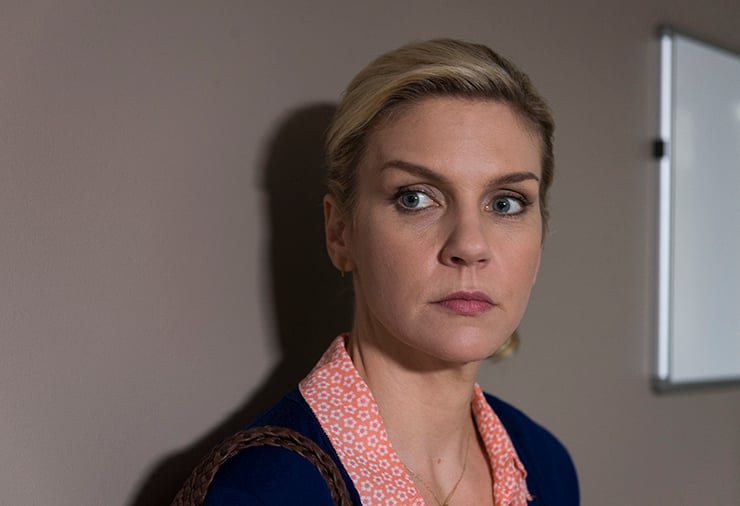Join or Sign In
Sign in to customize your TV listings
By joining TV Guide, you agree to our Terms of Use and acknowledge the data practices in our Privacy Policy.
Better Call Saul's Rhea Seehorn Discusses Kim's Wavering Moral Compass
Plus: Where will the show go in Season 3?
Monday's Season 2 finale of Better Call Saul clicked (klicked?) a few notches forward on the metaphorical dial that's transforming Jimmy McGill into Saul Goodman (Bob Odenkirk). This season saw Jimmy land a prestigious job at Davis & Main, working on an important case that he had built, only to abandon it and start his own firm, where he shared office space with his girlfriend, Kim Wexler (Rhea Seehorn). Kim had her own trials and tribulations at Hamlin, Hamlin and McGill, when she was trapped doing the miserable task of document review despite independently bringing in a huge client, a bank called Mesa Verde. She took Mesa Verde with her when she left, only to have HHM poach them back. This inspired Jimmy to falsify his brother Chuck's (Michael McKean) Mesa Verde documents while Chuck slept, making Chuck look incompetent during a hearing and sending Mesa Verde back to Kim.
But Jimmy's scheme may end up being the thing that brings both him and Kim down. When Chuck confronts Jimmy and Kim about the falsified documents in Episode 9, Kim tells Chuck has no evidence, and his contempt toward his little brother has made Jimmy into the problematic person he is today. But Kim knows Jimmy really did do it, and lets him know that she knows by hinting that he needs to make sure all of his tracks are covered, which leads to the incident in the copy shop. Kim allows herself to become complicit in Jimmy's unethical behavior because it benefits her. She may not like that this is what she has to do to land this case, but she's willing to accept it. Her career ambition is worth more than her morality, at least in this moment. The straight-and-narrow Kim Wexler is now a little crooked, just like everyone else on Better Call Saul.

"There's so much going on as far as the negotiation of the moral compass that they all grapple with," Rhea Seehorn tells TVGuide.com. "We'd all like to think that the needle just will point north and stay, but it changes depending on what's going on [with these characters]."
Seehorn as Wexler emerged as an integral, excellent part of Better Call Saul this season. She was solid in Season 1, but fully came into her own as the even-tempered foil to Odenkirk's mercurial Jimmy in Season 2. Odenkirk himself is spearheading Seehorn's Emmy campaign, declaring this season "the Rhea Seehorn year." In a way, she's emerged as Better Call Saul's Aaron Paul. Jesse Pinkman wasn't intended to be such a big part of Breaking Bad, but the writers found the character so interesting and Paul was so good that his character got expanded to the point where he was able to win an Emmy. Seehorn's trajectory is not dissimilar, as Kim has grown from a secondary character into one at the center of her own episode in Season 2, "Rebecca," which shows how Kim landed Mesa Verde in the first place.
Seehorn says she wasn't expecting her part to turn into what it has when she auditioned for Better Call Saul.
"I didn't know where it was going at all," she tells TVGuide.com. "I just knew I needed to make up a three-dimensional person, with a whole backstory, and that I was going to go in there and do a three minute performance of someone that I loved to play, and then [co-creators] Vince [Gilligan] and Peter [Gould] were going to figure out if I was the right person to help tell the story. And that's about all I could do."
AMC renews Better Call Saul for Season 3
Better Call Saul is in the interesting position of having a specific place to get to -- Jimmy McGill's rebirth as Saul Goodman, the criminal lawyer of Breaking Bad -- but no clear path of how to get there. The open-ended style of Better Call Saul's writers allows for plots to organically emerge in a way that more traditionally-arced shows don't.
"They don't like to paint themselves into corners," according to Seehorn, but prefer to plant a lot of possible narrative seeds in the scripts. The ones that blossom happen on their own. While this makes for a thrillingly unpredictable show, it also means that not even the writers know exactly what's going to happen next. Seehorn says the writers reconvened last week, and at that point were still "spitballing" ideas for Season 3. She doesn't know what's going to happen now that Chuck has Jimmy on tape admitting to falsifying the documents to help Kim, nor does she have any concrete ideas about what leads to the inevitable schism between Kim and Jimmy. Her speculation is worth about as much as any other Internet superfan.
And Seehorn doesn't even know if and when the squat cobbler videos are coming out. She hasn't seen them, but can vouch for their disturbing nature: "I caught a glimpse of one," she notes, "and that might be enough for a lifetime."
